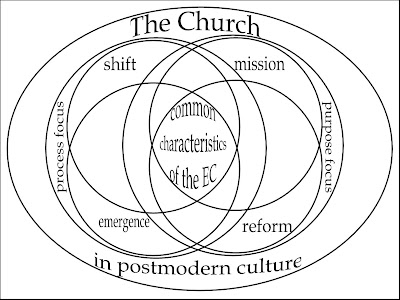Excerpted from
AN ARTICULATION AND EVALUATION OF AN EMERGING CHURCH ECCLESIOLOGY
By Laura K. Springer
Th.M. Thesis, May 2008
Talbot School of Theology, Biola University
Reader: Robert L. Saucy, Ph.D.
AN ARTICULATION AND EVALUATION OF AN EMERGING CHURCH ECCLESIOLOGY
By Laura K. Springer
Th.M. Thesis, May 2008
Talbot School of Theology, Biola University
Reader: Robert L. Saucy, Ph.D.
ECs come into being by the process of emergence and do so along a shift continuum that runs from a shift in practices to a shift in the reasons for these practices. Most ECs likely fall in the middle of the continuum, having a shift in practices based upon a shift in the reasons.
The purpose of this shift process is nothing less than the reformation of the church. Reacting to the ineffective processes of program modification and development, ECs see the postmodern turn as an opportunity for systemic change in church.
Two theological ideas form the theoretical basis for the process of shift. First, ECs consider the church inherently missional, living the gospel for the sake of the world. Second, ECs consider church to be inherently incarnational, being the Gospel in their neighborhoods for the sake of Christ.
In sum, ECs are characterized by bottom up, reformational change in theory and practice for the purpose of incarnational mission.
Related Posts:
A TENTATIVE IDENTIFICATION OF EC
HUNTING FOR TAXONOMIES
DEFINING THE EMERGING CHURCH
NOTE: This is a rumination ("1. The act of pondering; meditation. 2. The act or process of chewing cud." American Heritage Dictionary) in search of synergy ("1. The interaction of two or more agents or forces so that their combined effect is greater than the sum of their individual effects.")
Tag(s):
See CC License
“Unless otherwise noted Scripture quotations are from The Holy Bible, English Standard Version, copyright © 2001 by Crossway Bibles, a division of Good News Publishers. Used by permission. All rights reserved.” http://www.esv.org/







No comments:
Post a Comment